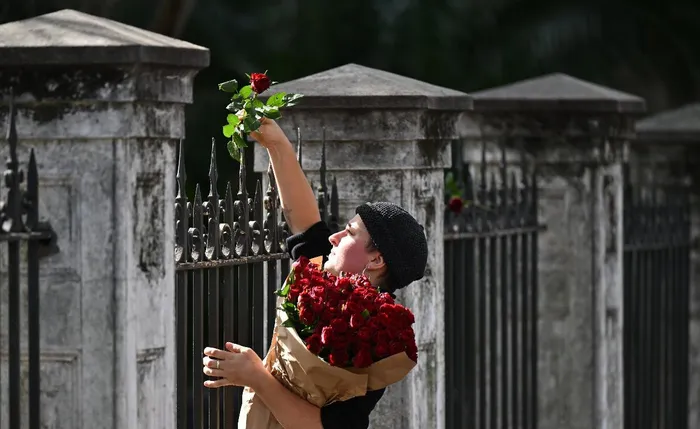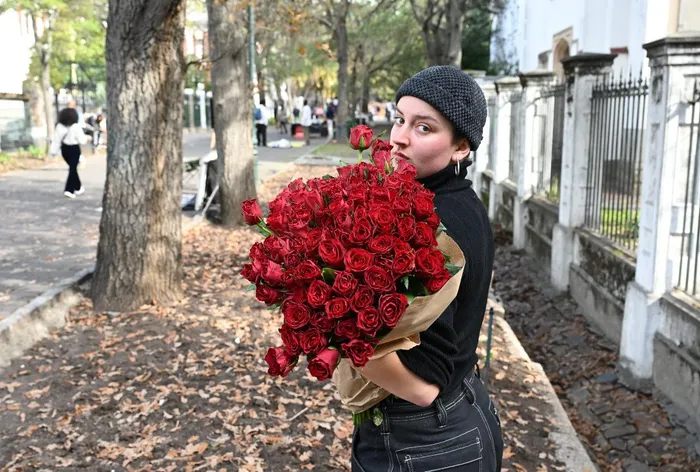115 red roses: Cape Town's powerful Women's Day silent protest against rape and GBV

Ra Searl with 115 red roses, each representing a woman who reports rape daily in South Africa, ahead of her protest action
Image: Henk Kruger
On Women’s Day, 115 red roses will appear across Cape Town, not as symbols of romance, but as silent protests against the violence that women endure.
The installation is the work of artist RA Searll, in collaboration with other artists and the organisation Women for Change SA, in a protest action named “The Truth Beneath the Roses” on National Women’s Day, August 9, 2025.
Each rose represents one of the 115 women who report rape in South Africa every single day. But the real number is far higher, only one in nine rapes are reported, meaning as many as 1,000 women may be raped daily.
These roses will not be placed in galleries or on manicured lawns. They will bloom in places heavy with unspoken histories: post offices, bus stations, police stations, and court buildings. Places where women were assaulted, where help was denied, where silence was policy.
“Rape isn’t a glitch in the system,” the campaign declares. “It is the system.”
Speaking to the Weekend Argus, Searll revealed that three of the roses represent her own experiences, on three different occasions.
“This is also something personal to me,” she said.
"Most, if not all, of the women, trans- and non-binary people I know have experienced some kind of sexual harassment, violence or assault at some point in their lives.
“So to each of the women who will be picking up a rose tomorrow, I want you to remember that you deserve to feel safe, free, and not live in constant fear or looking over your shoulders. We all deserve to feel like our bodies are ours. We shouldn’t have to feel like it’s a battlefield or a walking grave. You are a living, breathing, beautiful person, who deserves to live.”
Searll added that the rose symbolises the beauty and resilience in every woman.

The roses will be placed across various spots in Cape Town.
Image: Henk Kruger
The act is both a memorial and indictment. It points to a society where rape is expected, where boys are taught persistence is power, and girls are taught to shrink, calculate, and survive.
Searll’s message pulls no punches: we don’t have a consent problem, we have a power problem. The roses stand against a culture that grooms boys through jokes, media, and silence, teaching them that “no” is negotiable and that wearing down resistance is romance.
The campaign rejects the myths that shield perpetrators: the promising student, the good family, the bright future while women carry the cost in their bodies, careers, and lives.
“These roses aren’t romantic,” Searll explained. “They are ruptures. Quiet screams, stitched across the city. Phansi nge patriarchy. Phansi nge rape culture.”
One in three women in South Africa has experienced sexual or physical violence. For most, justice will never come. The Women’s Day roses demand not only that we stop looking away, but that we choose differently in our jokes, in our conversations with our sons, in whether we believe women when it’s uncomfortable.
As the roses appear, so does a call: violence is learned, but so is care. So is stopping. So is choosing differently.
Happy Women's day to all Weekend Argus readers.
tracy-lynn.ruiters@inl.co.za